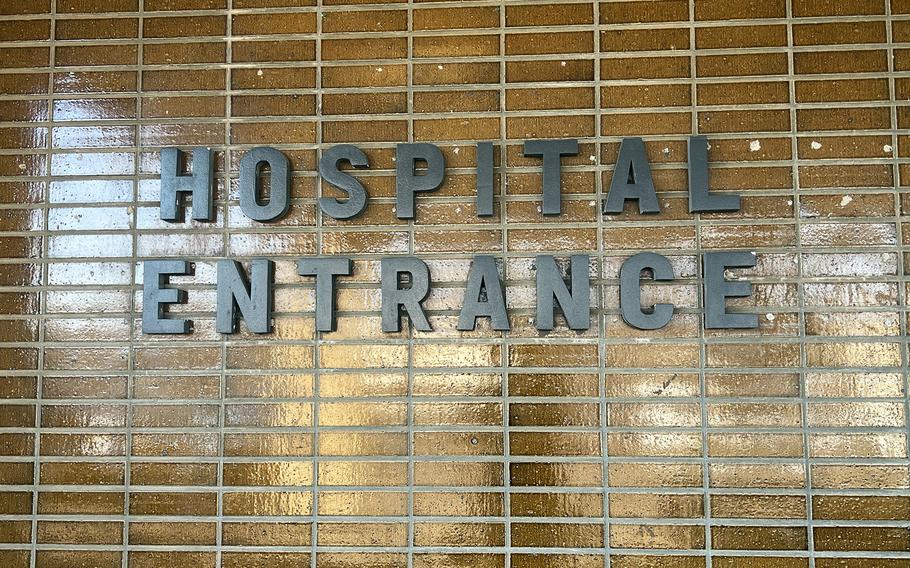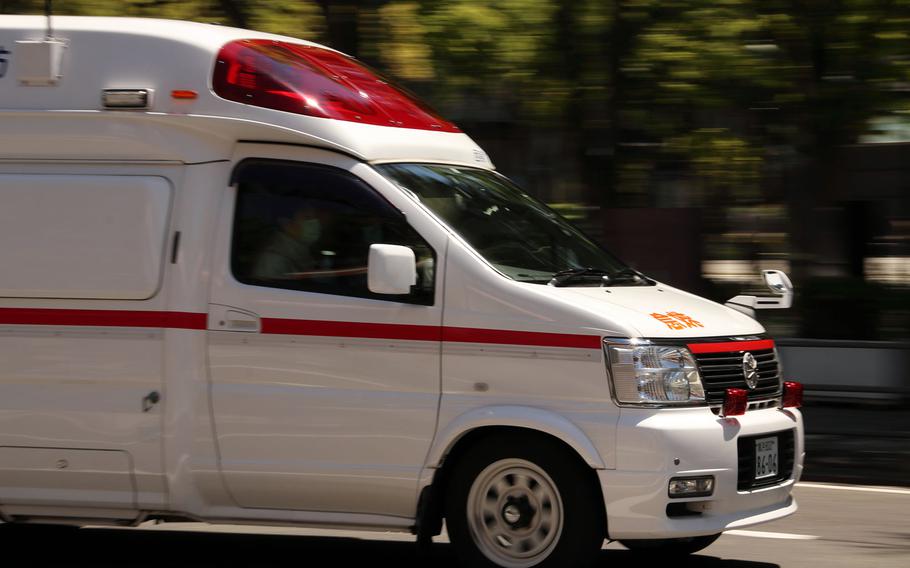
Since Jan. 1, 2023, Department of Defense civilians have been limited to space-available, same-day appointments at U.S. military hospitals, and treatment only for acute, non-recurring or episodic health conditions. (Kelly Agee/Stars and Stripes)
TOKYO – Japanese government officials and health care providers say they were not told in advance of a U.S. Department of Defense decision last year to force tens of thousands of its civilian employees into Japan’s health care system.
In October, Army Maj. Gen. Joseph Heck, director of the Defense Health Agency’s Indo-Pacific region, advised DOD civilian employees and their families to “have a plan in place” for medical care from off-base providers once DHA limits on their care at military hospitals took effect.
Since Jan. 1, DOD civilians have been limited to space-available, same-day appointments at U.S. military hospitals, and treatment only for acute, non-recurring or episodic health conditions.
“Treatment on a space available basis does not allow for continuous management of chronic health problems,” Heck wrote in a Dec. 9 memo.
‘Not aware of the matter’
However, Japanese authorities contacted by Stars and Stripes said they received no advance notice from DHA or the Pentagon that a flood of new clients may appear at Japanese providers this year. Japan has no obligation under the status of forces agreement to provide the U.S. military population with health care.
An official at Yokosuka Kyosai Hospital near Yokosuka Naval Base, the homeport of the U.S. Navy’s 7th Fleet, said he learned about the potential for new U.S. civilian clients from a Nov. 14 inquiry by Stars and Stripes. On Wednesday, he said the hospital had still heard nothing from authorities.

A Japanese ambulance drives through Yokohama in August 2020. (Akifumi Ishikawa/Stars and Stripes)
Official spokespeople in Japan are often required to speak to the media only on condition of anonymity.
Japan’s Ministry of Foreign Affairs was likewise unaware of the situation, a ministry spokesman said by phone Jan. 24.
“We have not been specifically contacted by the U.S. side and we are not aware of the matter,” the spokesman said.
The Ministry of Defense was also not aware of the situation, a ministry spokesman told Stars and Stripes on Friday.
A spokesman for U.S. Forces Japan said the command “did recently notify” the government of Japan about the DHA policy update, “although we cannot speak to GOJ’s notification/plan to the local hospitals.”
“The notification was made recently rather than prior to the effective date as its implementation across the medical treatment facilities in Japan was an evolving process, and as such we wanted to make official notifications with as much accuracy as possible and not cause confusion,” Gunnery Sgt. Jonathan Wright said in an email Friday.
‘I can see their struggle”
Dr. Ryu Sasae, director of NTT Medical Center Tokyo, an international clinic, learned about the situation through unofficial channels, he told Stars and Stripes by phone on Jan. 24. He said he understood DOD civilians’ concerns.
“I can see that it’s difficult, particularly in Japan, most often because of a language barrier and they are thrown into a different health care environment, and I can see their struggle,” he said.
To comply with the DHA mandate, U.S. military hospitals throughout Japan have instituted a system for space-available appointments after schedules are completed for higher priority clients, including active-duty service members, their families and others covered by Tricare Prime, the top-tier military health plan.
Typically, the remaining appointments in family medicine, gynecology, pediatrics and internal medicine are posted each morning on Facebook, which precipitates a phone rush for the handful of slots available.
In August at Yokota Air Base, the headquarters of U.S. Forces Japan in western Tokyo, the 374th Medical Group began limiting its routine pediatric services and management of chronic medical conditions to enrollees in Tricare Prime.
Yokosuka Naval Hospital in September imposed the broader limits to those civilians’ health care. After Jan. 1, those limits were in place at all U.S. military hospitals.
The change at Yokosuka alone affects about 4,000 civilians, a fraction of whom voiced concerns during a Sept. 29 town hall on base.
Approximately 300 people turned out for similar sessions on Jan. 5 at Yokota and on Jan. 12 at Marine Corps Air Station Iwakuni, near Hiroshima. At those meetings, base and hospital commanders said they commiserated with the civilians’ situation, but their hands were tied.
The DHA mandate stems from legislation enacted to prioritize active-duty medical care, according to Heck.
Attendees voiced concerns with accessing health care for their families and asked what services were still available at base hospitals. Some said they considered returning to the United States if access to medical care in Japan became difficult.
Warren letter
On Jan. 24, Sen. Elizabeth Warren, D-Mass., in a letter to the recently appointed DHA director, Maj. Gen. Telita Crosland, and Seileen Mullen, the acting assistant secretary of defense for health affairs, raised questions about civilian health care at military bases in Japan.
“Providing the best possible services to support service members and civilians deployed overseas enhances readiness, retention, and morale,” Warren wrote.
She also questioned whether DHA provided adequate support for civilians transitioning to telehealth or Japanese health care providers.
Warren also wrote that the DOD “appears to be blaming civilians for having health needs in the first place.” The Pentagon, she wrote, claims that civilian employees frequently arrive in Japan with health conditions that cannot be safely treated or that siphon away resources from active-duty service members and their families.
Warren’s letter came just weeks after an email and phone campaign organized by the Japan Civilian Medical Advocacy group seeking congressional support to reverse the Pentagon’s decision to reduce access to medical care at base hospitals.
Heck, Mullen and Gilbert Cisneros Jr., undersecretary of defense for personnel readiness, were scheduled starting Monday to appear at a series of town halls at bases across Japan to address civilians’ health care concerns.